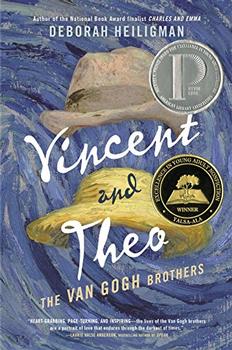Summary | Excerpt | Reviews | Beyond the Book | Readalikes | Genres & Themes | Author Bio

Critics' Opinion:
Readers' Opinion:
First Published:
Apr 2017, 464 pages
Paperback:
Oct 2019, 464 pages
 Book Reviewed by:
Book Reviewed by:
Rebecca Foster
Buy This Book
1.
TWO BROTHERS, ONE APARTMENT, PARIS, 1887
There was a time when I loved Vincent very much, and he was my best friend, but that's over now.
—Theo van Gogh to his sister Willemien, March 14, 1887
THEO'S BROTHER VINCENT has been living with him for just over a year, and Theo cannot take it anymore.
It is "almost intolerable for me at home," he writes to their sister Wil in March 1887. Even though Theo has moved them to a larger apartment, this one still feels too small to hold Vincent's outsized personality and Theo's desperate need for quiet. He's dying to tell Vincent to move out, but he knows if he does, Vincent will just be more determined to stay.
Dogged. Contrary. Stubborn. Vincent.
Theo van Gogh is the manager of Goupil & Cie, a successful art gallery on the fashionable Boulevard Montmartre in Paris. Theo is good at his job, but it's terrifically frustrating for him right now. The owners of the gallery want him to sell paintings in the traditional style because they're popular and bring in money. Though Theo certainly needs to make money—he has to support himself and Vincent and help their mother—he wants to sell art that is truly exciting to him, paintings by the Impressionists and their crowd, friends of his and Vincent's: Émile Bernard, Paul Gauguin, Claude Monet, and Henri de Toulouse-Lautrec. Soon, maybe even paintings by Vincent himself.
But these modern painters don't bring in enough money, so it's a constant battle with his bosses. Theo has persuaded them to let him set up a little display of Impressionists on the entresol. The entresol is not the ground floor, and it's not the first floor. It's the floor in between. It's as if the paintings are there, but not quite yet, a glimpse into the future. It's a start. But he spends his days working hard and comes back to the apartment at 54 Rue Lepic exasperated and exhausted. What he needs at home is rest and peace, but instead he gets VINCENT.
Theo loves his brother's brilliant mind, his gregariousness, even his fiery temperament. Vincent can be a good antidote to Theo's own inwardness and tendency to melancholy.
But after so many months of the cold Parisian winter spent indoors with Vincent, Theo is a wreck both mentally and physically. A few months back, in December, he was actually paralyzed—he couldn't move at all for a few days. Although Theo knows he can't blame his bad health on his brother, to get better he needs a break from Vincent's gusts, his squalls, his constant talking and lecturing.
And, to make matters worse, lately Vincent has been furious at him. "He loses no opportunity to let me see that he despises me and I inspire aversion in him," Theo tells Wil.
A portrait done of the brothers at this time would be sizzling with streaks of red-orange paint.
* * *
WHEN VINCENT AND THEO were young, growing up in the village of Zundert in the Netherlands, their father, a pastor, had written a special prayer. All the Van Gogh children had to memorize it and recite it when they left home:
"O Lord, join us intimately to one another and let our love for Thee make that bond ever stronger."
Theo has valiantly been living up to that prayer. He's been Vincent's best friend for most of the last fifteen years, ever since they made a pledge to each other on a walk. And through many ups and downs and storms, for the past seven years, Theo has been giving Vincent money for paint, pencils and pens, ink, canvases, paper, clothing, food, and, until he moved in, rent.
On March 30 Vincent turns thirty-four; on May 1 Theo will be thirty. They've made it this far in their journey together—how can Theo kick him out now?
Excerpted from Vincent and Theo by Deborah Heiligman. Copyright © 2017 by Deborah Heiligman. Excerpted by permission of Henry Holt and Company. All rights reserved. No part of this excerpt may be reproduced or reprinted without permission in writing from the publisher.





The Flower Sisters
by Michelle Collins Anderson
From the new Fannie Flagg of the Ozarks, a richly-woven story of family, forgiveness, and reinvention.

The House on Biscayne Bay
by Chanel Cleeton
As death stalks a gothic mansion in Miami, the lives of two women intertwine as the past and present collide.

The Funeral Cryer by Wenyan Lu
Debut novelist Wenyan Lu brings us this witty yet profound story about one woman's midlife reawakening in contemporary rural China.
Your guide toexceptional books
BookBrowse seeks out and recommends the best in contemporary fiction and nonfiction—books that not only engage and entertain but also deepen our understanding of ourselves and the world around us.